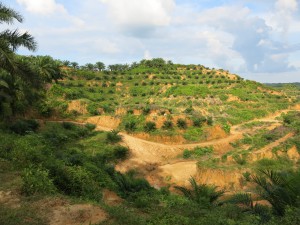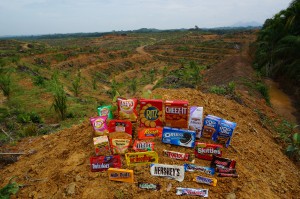
Over the past ten years, the disappearance of Indonesia’s and Malaysia’s most rich, pristine, and biologically diverse rainforests has been accelerating faster than ever.
These rainforests are now ground zero for climate change, and the only home of dwindling populations of wild orangutans, Sumatran tigers, elephants, and countless other life forms. Millions of people also depend on these forests for their survival, but are losing their livelihoods and way of life—all because of high demand for a cheap commodity present in roughly fifty percent of packaged foods: Conflict Palm Oil.
Most consumers don’t realize the power they have to help end this crisis. This is what RAN’s latest campaign, The Last Stand of the Orangutan, is seeking to accomplish: emboldening consumers like you to trigger shifts in the industry, an industry that is contributing to the crisis. The way in which RAN seeks to create such a market transformation is through our Theory of Change, which outlines our strategic plan for ending the production of Conflict Palm Oil—a plan that includes you!
“Theory of Change” is a term used to describe the roadmap and strategy in which a long-term goal can be achieved. The goal of The Last Stand of the Orangutan campaign is to end deforestation driven by the production of Conflict Palm Oil in countries like Indonesia and Malaysia. Our campaign is seeking to convince the Snack Food 20, global palm oil traders, and producers to implement palm oil policies that would ensure the production and sourcing of truly responsible, fully traceable palm oil. In order to accomplish these goals, we have identified key actors, stakeholders, and structures that are contributing to the problem (and thus hold the power to remedy it).
A critical part of our campaign’s theory of change is to untangle the complex web of actors operating within the global palm oil supply chain. By the time a bar of chocolate made by a Snack Food 20 company, such as Hershey’s, reaches your local grocery store, the palm oil within that chocolate has passed through many different steps along the supply chain, from the plantation where the oil palm fruit was grown to a mill, a refinery, a shipping vessel, another refinery in the US, a food manufacturing plant, and finally a retail outlet. Every actor along the supply chain, from the Snack Food 20 who put palm oil in the chocolate bar to the palm oil traders who buy and ship it and the palm oil producers who grow it, are benefiting from this complex web, as it’s hard to distinguish Conflict Palm Oil from truly responsible palm oil. By creating traceable supply chains, companies can learn where their palm oil is grown and readily eliminate known sources of Conflict Palm Oil.
Above all, the most important component of our theory of change involves creating market transformation through a step-by-step process that starts with you. Consumers (like you!) that care about the impact the products they enjoy have on the environment and human rights have immense power to create change in the way palm oil is produced. In order to create supply chain transparency, we first need you to demand it from the Snack Food 20—the companies putting Conflict Palm Oil in your favorite products. We want you to call on the Snack Food 20 to adopt and implement responsible palm oil purchasing policies. If enough people do so, companies will listen, because they care a lot about what you think of their brands!

Once consumers have the Snack Food 20’s attention, these companies will begin to take measures ensuring that their supply of palm oil is not connected to deforestation and human rights violations. With your help, we can get companies to adopt RAN’s demands that they: publicly articulate their commitment to protecting forests, peatlands, biodiversity and the rights of the people who live in and rely on the forests; adopt a global responsible palm oil purchasing policy that requires their suppliers to eliminate sources of Conflict Palm Oil; develop a robust, time-bound implementation plan for the policy; create supply chain transparency and traceability and become advocates for their peers—the traders and producers they buy palm oil from—to do the same.
Some companies are already suggesting that they are making a difference by using palm oil certified by the Roundtable on Sustainable Palm Oil (RSPO). But sourcing RSPO-certified oil isn’t enough as the RSPO continues to certify companies that are destroying secondary rainforests and peatlands, violating human rights and using forced or child labor. If a few leading brands adopt RAN’s demands, which go above and beyond the RSPO, this can ignite change throughout the entire palm oil sector. When leaders step up, others follow. The demand for responsible palm oil will grow and provide a significant incentive to end controversial practices. This is the second step in our theory of change.
In order to implement their responsible palm oil purchasing policies, the Snack Food 20 must demand that global palm oil traders such as Cargill, Wilmar, IOI, and KLK supply them with truly responsible and traceable palm oil. This will have dramatic effects, as these traders are the linchpins of the world’s palm oil supply and have real buying power with the companies that grow and process palm oil. Companies such as Wilmar control up to 45% of the world’s palm oil supply. So, when traders respond to the demand for responsible palm oil and insist that the palm oil they buy from refineries, mills and producers is fully traceable and not associated with deforestation, expansion on carbon-rich peatlands, or human and labor rights violation, this will radically alter the course of the crisis in Southeast Asia.
Making sure that the demand for responsible palm oil reaches producers is highly critical, as producers are at the top of the palm oil supply chain and on the frontlines of deforestation and human rights violations. Only when producers eliminate deforestation and peatland expansion and address human and labor rights issues will they be able to supply responsible palm oil to traders and the Snack Food 20.
 Our theory of change is one reason why we aren’t calling for a boycott. Besides the fact that palm oil is so ubiquitous that a boycott would be nearly impossible, if our approach is successful, destructive practices will be eliminated as traders and producers change their operations to meet the demands for responsible palm oil.
Our theory of change is one reason why we aren’t calling for a boycott. Besides the fact that palm oil is so ubiquitous that a boycott would be nearly impossible, if our approach is successful, destructive practices will be eliminated as traders and producers change their operations to meet the demands for responsible palm oil.
We hope that supporters like you will join us as we create this market transformation. The power is in your palm to protect the last stands of the orangutan. It’s simple, join our Palm Oil Action Team, and upload an #InYourPalm photo petition here that will call on the Snack Food 20 to demand responsible, conflict-free palm oil.